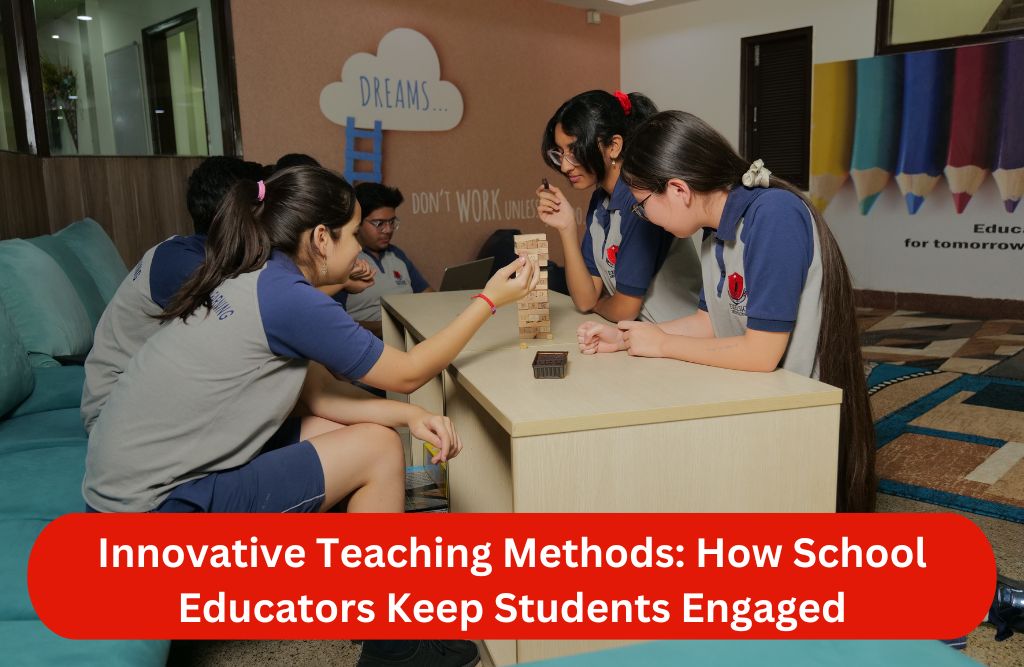Introduction:
Excelsior American School, situated in the vibrant city of Gurgaon, is renowned for its commitment to providing a dynamic and engaging learning environment for its students. A cornerstone of this commitment lies in the school’s innovative teaching methods, which aim to captivate students’ curiosity, foster critical thinking, and inspire a lifelong love for learning. In collaboration with some of the Top 10 CBSE School in Gurugram, It continues to push the boundaries of traditional education, embracing new pedagogical approaches that empower students to thrive in an ever-evolving world.
The Flipped Classroom: Turning Learning Upside Down
School adopts the flipped classroom model, a pioneering teaching method that reverses the traditional roles of in-class instruction and homework assignments. Through pre-recorded lectures, instructional videos, and online resources, students engage with course material at their own pace and convenience outside of class. This frees up valuable class time for collaborative activities, hands-on projects, and in-depth discussions, allowing teachers to provide personalized support and guidance tailored to each student’s learning needs.
Project-Based Learning: Learning by Doing
Project-based learning (PBL) lies at the heart of the School’s teaching philosophy, offering students opportunities to apply their knowledge and skills to real-world challenges and scenarios. Through interdisciplinary projects, students collaborate in teams to solve complex problems, conduct research, and present their findings to classmates and faculty members. By immersing students in authentic, hands-on learning experiences, PBL fosters creativity, critical thinking, and problem-solving skills essential for success in the 21st century.
Differentiated Instruction: Meeting Every Student’s Needs
The School embraces differentiated instruction, a student-centered approach that recognizes and accommodates the diverse learning styles, abilities, and interests of students. Teachers employ a variety of instructional strategies, materials, and assessments to tailor instruction to individual students’ needs, ensuring that every learner is challenged and supported at their appropriate level. Whether through small group activities, tiered assignments, or flexible grouping, differentiated instruction promotes inclusivity, engagement, and academic growth for all students.
Technology Integration: Enhancing Learning Experiences
It leverages technology as a powerful tool to enhance teaching and learning experiences in the classroom. From interactive whiteboards and multimedia presentations to educational apps and virtual reality simulations, technology enriches lessons, engages students, and facilitates interactive learning experiences. Teachers use digital platforms to deliver content, assess student progress, and provide timely feedback, fostering digital literacy skills and preparing students for success in a technology-driven world.
Experiential Learning: Bringing Learning to Life
The School embraces experiential learning as a transformative approach that brings learning to life through firsthand experiences, exploration, and discovery. Whether through field trips, guest speakers, service learning projects, or outdoor education programs, students engage with the world beyond the classroom walls, gaining practical skills, empathy, and global awareness. Experiential learning fosters curiosity, resilience, and a deeper understanding of diverse perspectives, preparing students to become active, responsible citizens in an interconnected world.
Collaborative Learning: Learning Together, Growing Together
Collaborative learning is a cornerstone of it’s educational approach, emphasizing peer-to-peer interaction, teamwork, and collective problem-solving. Through collaborative projects, group discussions, and cooperative learning activities, students develop communication skills, empathy, and respect for diverse viewpoints. By working together towards common goals, students learn to appreciate the value of collaboration, build social connections, and cultivate a sense of belonging within their learning community.
Assessment for Learning: Empowering Student Growth
It employs assessment for learning practices to empower student growth and development. Instead of traditional tests and exams solely focused on grading, teachers use formative assessments, peer feedback, and self-assessment tools to gauge students’ understanding, identify areas for improvement, and provide targeted support. By involving students in the assessment process and emphasizing learning over grades, It cultivates a growth mindset, resilience, and a commitment to continuous improvement.
Inquiry-Based Learning: Cultivating Curiosity and Critical Thinking
Inquiry-based learning forms the foundation of it’s approach to education, placing students at the center of their learning journey. Through open-ended questions, hands-on investigations, and problem-solving tasks, students explore complex concepts, develop analytical skills, and construct their own understanding of the world. Teachers serve as facilitators, guiding students through the inquiry process and encouraging curiosity, creativity, and deep engagement with content.
Global Perspectives: Fostering Intercultural Competence
The School embraces global perspectives as an integral component of its curriculum, fostering intercultural competence and global citizenship among students. Through interdisciplinary units, multicultural literature, and global awareness initiatives, students explore diverse cultures, histories, and perspectives from around the world. By promoting empathy, respect, and understanding across cultural boundaries, It prepares students to thrive in a multicultural society and contribute positively to a globalized world.
Environmental Education: Nurturing Stewardship and Sustainability
It integrates environmental education into its curriculum to cultivate stewardship, sustainability, and environmental literacy among students. Through hands-on projects, nature walks, and community-based initiatives, students learn about ecological principles, environmental issues, and the importance of conservation. By fostering a sense of responsibility for the natural world, It empowers students to become informed advocates for environmental protection and champions of sustainability in their communities.
Student-Centered Learning: Empowering Student Voice and Choice
It prioritizes student-centered learning approaches that empower students to take ownership of their learning and pursue their interests and passions. Through personalized learning plans, project-based inquiry, and student-led discussions, students have the opportunity to explore topics that resonate with them, delve into areas of curiosity, and pursue independent research and projects. By valuing student voice and choice, It fosters intrinsic motivation, autonomy, and a love for learning that extends beyond the classroom.
Conclusion:
Excelsior American School’s commitment to innovative teaching methods underscores its dedication to providing a dynamic and enriching educational experience for its students. Through flipped classrooms, project-based learning, differentiated instruction, technology integration, experiential learning, and collaborative learning, School empowers students to become lifelong learners, critical thinkers, and global citizens prepared to navigate the complexities of the modern world. In collaboration with the Best CBSE School in Gurugram, Excelsior continues to push the boundaries of education, inspiring students to reach their full potential and thrive in an ever-changing society.


